ศึกษาธรรมะ จากธรรมชาติ วันเวลาเคลื่อนคล้อย ฤดูกาลที่เปลี่ยนไป ทำให้เราคิดถึงตัวเองมากขึ้น อย่าปล่อยเวลาว่างให้ล่วงเลยไปเปล่า ๆ หาอะไรทำที่เป็นประโยชน์แก่ตนเอง และสังคมบ้าง ตื่นนอนขึ้นมามองหาสิ่งที่จะทำประโยชน์ตนประโยชน์ท่านดีกว่า 



1. จงให้มากกว่าที่ผู้รับต้องการ และทำอย่างหน้าชื่นตาบาน
2. จงพูดกับคนที่ถึงแม้จะอายุน้อยกว่า แต่เขาก็มีความสำคัญเท่ากัน
3. จงอย่าเชื่อทุกอย่างที่ได้ยิน ใช้ทั้งหมดที่มี และนอนเท่าที่อยากจะนอน
4. เมื่อกล่าวคำว่า 'ฉันรักเธอ' จงหมายความตามนั้นจริง ๆ
5. เมื่อกล่าวคำว่า 'ขอโทษ' จงสบตาเขาด้วย
6. ก่อนจะตัดสินใจแต่งงาน จงหมั้นเสียก่อนอย่างน้อย 6 เดือน
7. จงเชื่อในรักแรกพบ
8. อย่าหัวเราะเยาะความฝันของผู้อื่น คนที่ไม่มีฝันก็เหมือนไม่มีอะไร
9. เมื่อรักจงรักให้ลึกซึ้ง และ ร้อนแรง อาจจะต้องเจ็บปวดแต่นั่นคือหนทางเดียวที่ทำให้ชีวิตถูกเติมเต็ม
10. ในเหตุการณ์ขัดแย้ง โต้อย่างยุติธรรม ไม่มีการตะโกนใส่กัน
11. อย่าตัดสินคนเพียงเพราะญาติๆ ของเขา
12. จงพูดให้ช้า แต่ต้องคิดให้เร็ว
13. ถ้าถูกถามด้วยคำถามที่ไม่อยากตอบ จงยิ้มแล้วถามกลับว่า จะรู้ไปทำไม
14. จงจำไว้ว่า สองสิ่งที่ยิ่งใหญ่ คือความรัก และความสำเร็จ ล้วนต้องมีการเสี่ยง
15. พูดว่า ขอพระคุ้มครอง เมื่อได้ยินใครจาม
16. เมื่อพ่ายแพ้ จงอย่าสูญเสียบทเรียนไปด้วย
17. จงจำ 3 R :- นับถือผู้อื่น นับถือตนเอง รับผิดชอบในสิ่งที่ตัวเองทำ
18. จงอย่าให้ความขัดแย้งเล็กๆ น้อยๆ มาทำลายมิตรภาพที่ยิ่งใหญ่
19. ทันทีที่รู้ตัวว่าทำผิด ลงมือแก้ไขทันที
20. จงยิ้มเวลารับโทรศัพท์ ผู้ฟังจะเห็นได้จากน้ำเสียงของเรา
21. จงหาโอกาสอยู่กับตัวเองบ้าง
Snow falls at Wat Thai, DC. USA.
Dr.Phramaha Thanat Inthisan report from Washington,DC.
Feb.6,2010
Time : 12.30 pm.
เชิญชมภาพคลิปวีดีโอ ถ่ายไว้ขณะที่พายุหิมะตกถล่มทั่วบริเวณมลรัฐแมรี่แลนด์ มลรัฐเวอร์จีเนีย และกรุงวอชิงตัน,ดี.ซี.ประเทศสหรัฐอเมริกา ภาพที่เห็นนี่คือบริเวณหน้าอุโบสถพระพุทธมงคลวิมลดีซี.วัดไทยกรุงวอชิงตัน,ดี.ซี. บันทึกเมื่อวันที่ ๖ กุมภาพันธ์ ๒๕๕๓ เวลา ๑๒.๓๐ น.โดย ดร.พระมหาถนัด อตฺถจารี พระธรรมทูตวัดไทยฯ ดี.ซี.


วัดไทยฯ ดี.ซี. ศูนย์รวมความดีเพื่อสังคมไทยในU.S.A.
วัดไทยกรุงวอชิงตัน ดี.ซี. ก่อกำเนิดเกิดขึ้นมาด้วยสายธารศรัทธาของพุทธศาสนิกชนชาวไทย และชาวต่างชาติแต่ศาสนาเดียวกัน ซึ่งต้องการมีแหล่งรวมใจ หรือศูนย์รวมแห่งจิตวิญญาณ อันมีพระสงฆ์เป็นผู้ที่ทำหน้าที่ผู้นำแห่งจิตวิญญาณ และเป็นที่พึ่งทางใจแก่ชาวไทย และชาวพุทธจากประเทศต่าง ๆ ในโลกที่จากบ้านเกิดเมืองนอนมาใช้ชีวิตอยู่ในแดนไกล
จากจุดเริ่มต้นของชุมชนไทยในเขตกรุงวอชิงตัน, ดี.ซี.ที่ต้องการจะมีวัดไทย ได้ก่อตั้งขึ้นเมื่อปี พ.ศ. ๒๕๑๗ (ค.ศ.๑๙๗๔) จนถึงปัจจุบัน มีอายุถึง ๓๖ ปีแล้ว วัดไทยฯ ดี.ซี.ได้พัฒนาขึ้นเรื่อย ๆ ทั้งด้านวัตถุ และสิ่งที่เป็นนามธรรม คือทำหน้าที่หล่อหลอมสังคมไทย สังคมชาวพุทธในอเมริกาได้อย่างรวดเร็ว จนต้องย้ายสถานที่ประกอบศาสนกิจถึง ๒ ครั้ง และที่ปัจจุบันเป็นแห่งที่ ๓ เป็นสถานที่ที่เหมาะสม สามารถอำนวยความสะดวกให้แก่ชุมชน คนที่เข้ามาวัดที่มีจุดมุ่งหมายที่แตกต่างกัน เช่นเพื่อศึกษาและปฏิบัติธรรมตามหลักคำสอนในทางพระพุทธศาสนา เพื่อเรียนภาษาไทย และวัฒนธรรมไทย และเพื่อบำเพ็ญบุญกุศลในโอกาสต่าง ๆ
วัดไทยกรุงวอชิงตัน ดี.ซี. ศูนย์ฯ ความดีแห่งสังคมไทยในอเมริกาภารกิจอันสำคัญในการหล่อหลอมสังคมไทยในสหรัฐอเมริกา ให้อยู่ในกรอบแห่งวัฒนธรรม ประเพณีไทย คือการจัดการศึกษาแก่เยาวชนลูกหลานไทยที่เกิดและเติบโตในสังคมอเมริกัน ซึ่งมีความหลากหลายวัฒนธรรม โรงเรียนพระพุทธศาสนาวันอาทิตย์ ได้จัดการเรียนการสอนครั้งแรก ในปี พ.ศ. ๒๕๑๙(ค.ศ.๑๙๗๖) โดยมีครูอาสาสมัครในพื้นที่เขตปริมณฑลกรุงวอชิงตัน ดี.ซี. ร่วมกับพระสงฆ์ทำหน้าที่ช่วยกันสอนภาษาไทย วัฒนธรรมไทย และพระพุทธศาสนา แก่เด็ก ๆ เยาวชน ลูกหลานชาวไทยให้มีความรู้ความเข้าใจสามารถพูด ฟัง เขียน และอ่านภาษาไทยได้ ตลอดถึงการถ่ายทอดจิตสำนึกในความเป็นไทย ให้รักและศรัทธาในเอกลักษณ์ของความเป็นคนไทย ซึ่งโครงการนี้ได้รับความสนใจจากผู้ปกครองได้นำบุตรหลานเข้ามาเรียนภาษาไทย และวัฒนธรรมไทย มารยาทไทย เข้าใกล้ชิดกับพระพุทธศาสนา โดยมีข้าราชการสถานเอกอัครราชทูต พ่อค้า ประชาชน ในเขตกรุงวอชิงตัน ดี.ซี. มลรัฐเวอร์จีเนีย และมลรัฐแมรี่แลนด์ ให้การสนับสนุน ส่งเสริมการศึกษาส่วนนี้ด้วยดีตลอดมา








ส่วนพระสงฆ์ผู้ที่ทำหน้าที่เป็นผู้นำทางจิตวิญญาณนั้น พระเดชพระคุณหลวงพ่อ พระวิเทศธรรมรังษี หรือ หลวงตาชี ได้เป็นศูนย์รวมจิตใจของชุมชนมาตลอดตั้งแต่เริ่มแรก และพร้อมด้วยคณะสงฆ์พระธรรมทูตรุ่นต่อ ๆ มา ทำหน้าที่หล่อหลอมสังคมไทย ด้วยการใช้หลักพุทธธรรมนำชีวิต สร้างความมั่นใจ และมั่นคงในหลักธรรมแก่ชาวพุทธ จนทำให้สังคมชาวพุทธไทยในอเมริกามีความเป็นปึกแผ่นแน่นหนา เพราะพลังแห่งความสามัคคี อันมีวัดไทยกรุงวอชิงตัน, ดี.ซี.เป็นศูนย์กลาง
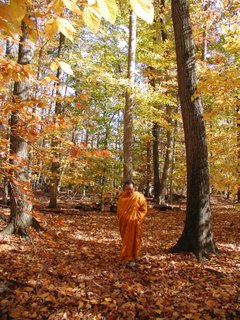
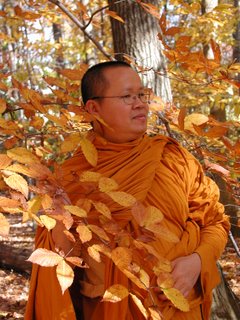
What is the Goal of Buddhism?
The Awakened One, the Buddha, classified people into two groups and set goals for both to help them according to their capabilities, namely;
1. Goal for the householders, and
2. Goal for those who life monastic life or monks.
Goal for householders is to live their life in a happy way by following at least three of the precepts of the Eightfold Path namely; right action, right speech and right livelihood in moral training. This includes the administration and governmental affairs, as the Buddha introduced 10 virtues* of rulers or administrators to carry out duties and responsibilities in righteous ways.
Goal far the monks or those who live monastic life is Nibbana,enlightenment or perfect freedom of the mind by following me Eightfold Path as above mentioned. The monks have to strictly observe moral conduct (Sila Visuddhi) and clarification of their moral disciplines set out by the Buddha, proved by the Sangha. Monks must train themselves in meditation practice (Samadhi-Vipassana Bhavna) to cultivate wisdom to be able to purify their minds from mental impurities or delusion.


Wisdom Training:
Wisdom is the way to see the ultimate truth of reality. When the mind of the meditation practitioner becomes calm, dear and peaceful, he or she may apply peaceful mind to look at the ways of all thing visible and invisible as they really are. Their ways are as follows;
1. Impermanence (Aniccam)
2. Hard to maintain (Dukkham)
3. Out of control (Anatta)
When the mind understands the way of everything as it really is, the mind does not cling and does not attach to anything, the meditation practitioner will see and view all things with a realistic approach. At that level of meditation the mind becomes free from all kinds of mental defilement, becoming a mind that can be called free mind, independent mind, perfect mind or enlightened mind. The person who lives with this mind will always live his or her life in peace and happiness here and now, not waiting until after death. This is what the Buddha taught and the goal of Buddhism.
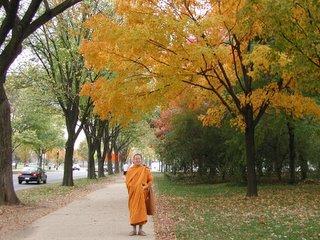
Mental Discipline:
When we develop moral conduct, we are certain to have peaceful family and peaceful society, and then we are ready to go for meditation practice for more training in mental culture. Mental culture develops the human mind to become a noble being and finally to become a perfect noble one through wisdom training. There are two lands of mental culture, namely; Concentration meditation (Samatha Bhavna) and Insight meditation (Vipassana Bhavna). The details of meditation practice cannot be given here but those who want more information about meditation practice may contact Wat Thai,D.C. at the mailing address provided below.
Moral Conduct:
Moral conduct is the basic principle of Buddhism for the training and developing of an ordinary person to become a perfect human being. It consists of commitment to (1) avoid killing and harming living beings while trying to develop loving-kindness and compassion; (2) avoid taking what is not given while trying to develop sincerity and respect for ownership and the possessions of others; (3) avoid sexual misconduct while trying to develop honesty and respect toward the opposite sex; (4) avoid false speech while trying to develop truthfulness and sincerity; (5) avoid taking intoxicating drink and harmful drugs while trying to develop mindfulness and awareness in daily life.
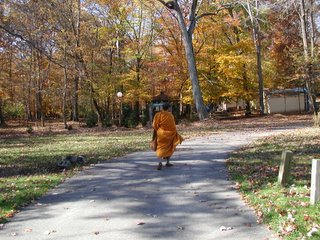
The Middle Path, which gives vision and knowledge and leads to experiencing Calm, Insight, Enlightenment, Nibbana. This Path is known hi Pali as Ariya-Atthangika-Magga because it is composed of eight categories, namely:
Wisdom level
1. Right Understanding (Samma-ditthi)
2. Right Thought (Samma-sankappa)
Moral level
3. Right Speech (Samma-vaca)
4. Right Action (Samma-kammanta)
5. Right Livelihood (Samma-ajiva) Samadhi level
6. Right Effort (Samma-vayama)
7. Right Mindfulness (Samma-sati)
8. Right Concentration (Samma-samadhi)
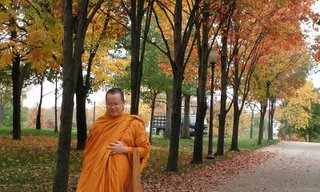
Buddha explained the Dhamma in different ways with different words to different people, according to the stage of their development and their capacity to understand and follow him, but the essence of those many thousand discourses scattered hi the Buddhist Scriptures are found hi the Noble Eightfold Path and summarized hi the Threefold Doctrines namely;
1. Not to do bad
2. To do good, and
3. To purify the mind from its impurities or mental defilement









